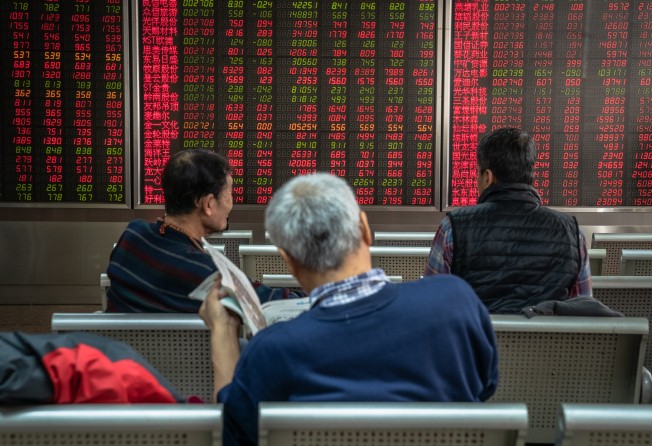China stocks end higher on strong economic data, while Hang Seng Index drops on protest-hit properties
- Stronger than expected industrial output and retail sales data cheer investors in China; tech stocks and selective brokerages gain
- Hang Seng snaps three straight days of gains on profit taking

China stocks rose Monday on stronger-than-expected November economic data, but Hong Kong shares fell on profit taking.
The Shanghai Composite Index rose 0.6 per cent to 2,984.39, while the CSI 300, which tracks blue chips listed on Shenzhen and Shanghai, rose 0.5 per cent to 3,987.55.
By contrast, the Hang Seng Index lost 0.7 per cent to finish at 27,508.09, snapping a three straight session winning streak.
Industrial production, which measures China’s industrial output including manufacturing, mining and utilities, grew by 6.2 per cent in November, up from October’s 4.7 per cent. Meanwhile, retail sales grew by 8.0 per cent in November, up from 7.2 per cent a month ago.
The data followed the phase one US-China trade deal last week, which some analysts say has removed a level of uncertainty that clouded the outlook of the equities market in recent weeks.
“Foreign investors’ buying continues to support the A share market, as shown in the 23 straight days of net inflow into mainland A shares through the Hong Kong northbound Stock Connect,” said Linus Yip, chief strategist at First Shanghai Securities.
Selective brokerages performed well, with CSC Financial hitting the 10 per cent daily up limit, to 27.12 yuan; Huatai Securities rose 3.2 per cent to 19.13 yuan. Their gains came after China’s securities watchdog said it would relax requirements for A-share companies to spin off and separately list their subsidiaries on the domestic exchanges.
Tech stocks also did well, with Foxconn Industrial rising 1.2 per cent to 19.15 yuan, TCL Corp climbing 9.9 per cent to 4.33 yuan, and Universal Scientific Industrial hitting the 10 per cent up limit at 20.08 yuan.
Both Shenzhen Refond Optoelectrnoics and HC SemiTek hit the daily up limit, rising to 7.56 yuan and 7.18 yuan respectively.
“In a way, the signing of the ‘phase one’ deal has temporarily removed some concerns that the global tech supply chain between US and China would be disrupted, hence supporting tech stocks,” said Yip.
This week, Yip expects the Shanghai Composite could see further upside back to the 3,000, a level it has not reached since mid-September.
In Hong Kong, property developers declined. News flow from Sun Hung Kai Properties, whose revenue at its hotels division had plummeted by up to half in November and December, compounded investors concern about the city’s tourism industry, which struggled to stay afloat amid seven months of anti-government protests.
The weekend’s vandalism and arson in a few districts in Hong Kong continued to worry traders about when the city’s economic contraction from the half-year long anti-government protests will bottom out. The government has already forecast a 1.3 per cent full year contraction for 2019.
Link Reit lost 1.4 per cent to HK$79.4, Sun Hung Kai Properties dropped 1.1 per cent to HK$117, and Swire Pacific lost 1.4 per cent to finish at HK$72.3.
Weighing on the index were social media giant Tencent, which lost 0.3 per cent to HK$359.8, and insurer AIA, which lost 2 per cent to close at HK$81.
But outside the blue chips, China smart phone giant Xiaomi rose 1.2 per cent to HK$10.52, after a report on third quarter wearable band market from research firm Canalys showed that its third quarter wearable bands shipment reached 12.2 million units, 74 per cent higher year-on-year.
Yip expects the Hang Seng Index to hover at the 27000- 28,000 level this week.